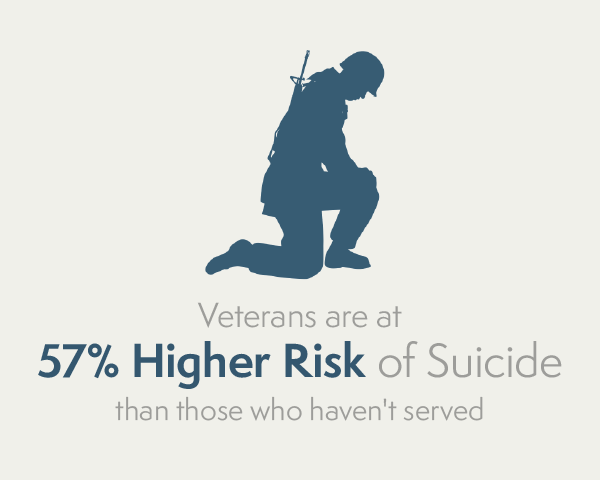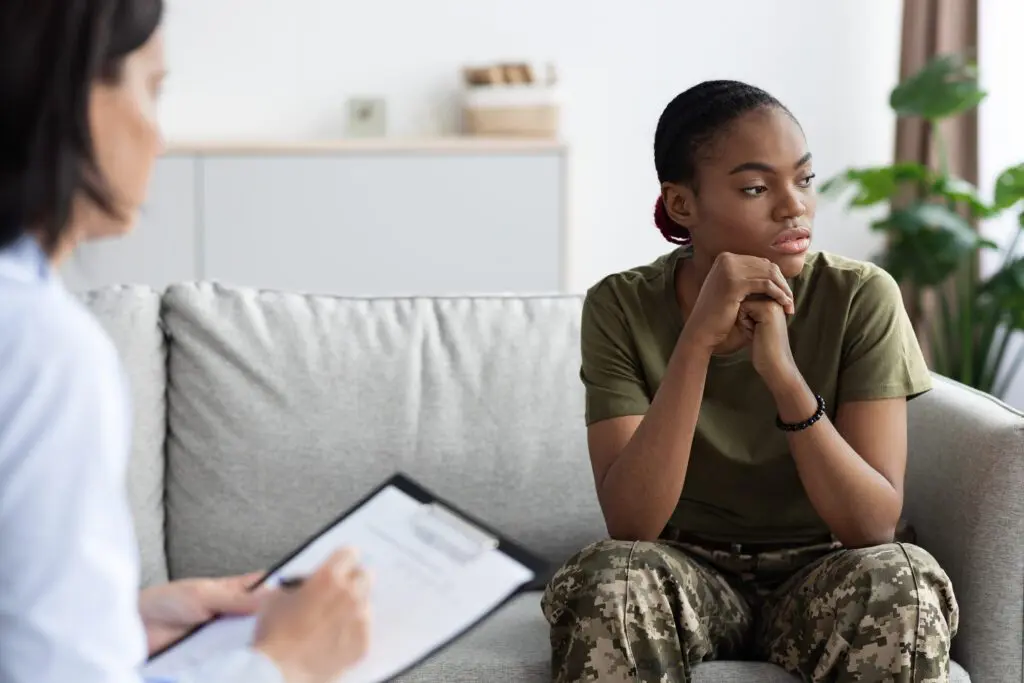Facts on Military and Veteran Suicide
- Veterans are at 57% higher risk of suicide than those who haven't served.1
- In 2021, there was an average of 17.5 Veteran suicides per day – 6,392 in total.3
- Suicide is the 2nd leading cause of death in Veterans under age 45.2

Military and Veteran Suicide Rates
While anyone can experience suicide risks, certain groups have substantially higher rates of suicide than the general U.S. population. Veterans bear a disproportionate but preventable burden. Tragically, out of the approximately 129 suicides per day in 2021, 17 of those lives lost were Veterans. In 2021, among the average of 17.5 Veteran suicides per day, an estimated 6.65 suicides per day were among those with VHA encounters in 2020 or 2021, whereas 10.85 per day were among Veterans with no VHA encounter in 2020 or 2021.3
Of the 46,412 suicides among adults in the U.S., there were 6,392 Veteran suicides (114 more than in 2020). Overall, the number and rate of suicide deaths increased from 2020 to 2021 for Veterans, non-Veteran adults, and U.S. adults.3
Additional Resources on ‘Military and Veteran Suicide Rates’


PTSD and TBI Risk Factors
Both PTSD and TBI can increase the risk of suicide. Studies by the Department of Veterans Affairs found that a history of TBI or PTSD is associated with a substantially increased likelihood of suicide attempts compared to those without the diagnosis — 1.5 and 2.8, respectively. For those with both TBI and PTSD, the likelihood of a suicide attempt is 3.3 times greater than for those with a TBI alone. Studies among civilians also show a link between suicide and a history of PTSD and/or TBI.
Veterans living with PTSD are at a higher risk of suicide, as they spend years waiting for a diagnosis that will explain their symptoms or cycle through numerous treatments without finding relief.
Brain trauma changes the structure and function of the brain and can lead to various cognitive, physical, and emotional symptoms. Some of these symptoms may appear immediately after the traumatic event or brain injury, while others may be delayed, emerging months, or even years later. This complexity makes diagnosing and treating PTSD and TBI more difficult.
Delayed diagnosis and ineffective treatments can result in the most devastating outcome of all, suicidality. For the first time in our nation’s history, suicides from invisible wounds are outpacing the number of in-theatre deaths from physical wounds.
We must treat the underlying conditions that increase the risk of suicide.
- Despite decades of promising research and billions spent on clinical studies, there are no cures for the invisible wounds.
- Patients are diagnosed based on subjective, patient-reported symptoms, not in an objective way based on their unique biology.
- We lack reliable, evidence-based treatments.
Additional Resources on ‘PTSD and TBI Risk Factors’
Need Help Now?
Are you a Veteran in crisis or concerned about one? You’re not alone—the Veterans Crisis Line is here for you. You don’t have to be enrolled in VA benefits or health care to call.
Dial 988, then press 1
or visit www.veteranscrisisline.net
Resources and Further Reading
- If you have taken steps to end your life, call 911 immediately.
- National Suicide Prevention Hotline – Dial 988
- National Sexual Assault Hotline – (800) 656-HOPE
- National Center for PTSD – Veterans Crisis Line – (800) 273-8255
- Women’s Veterans Call Center – (855) VA-Women
Cohen Veterans Bioscience (CVB) is a non-profit 501(c)(3) public charity research organization and does not offer medical advice. CVB encourages you to seek medical advice from a physician or healthcare provider if you have questions regarding a medical condition or to call 911 or go to the nearest hospital if you find that you or someone you are concerned about is in an emergency situation.
















